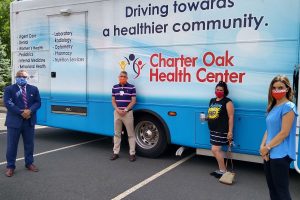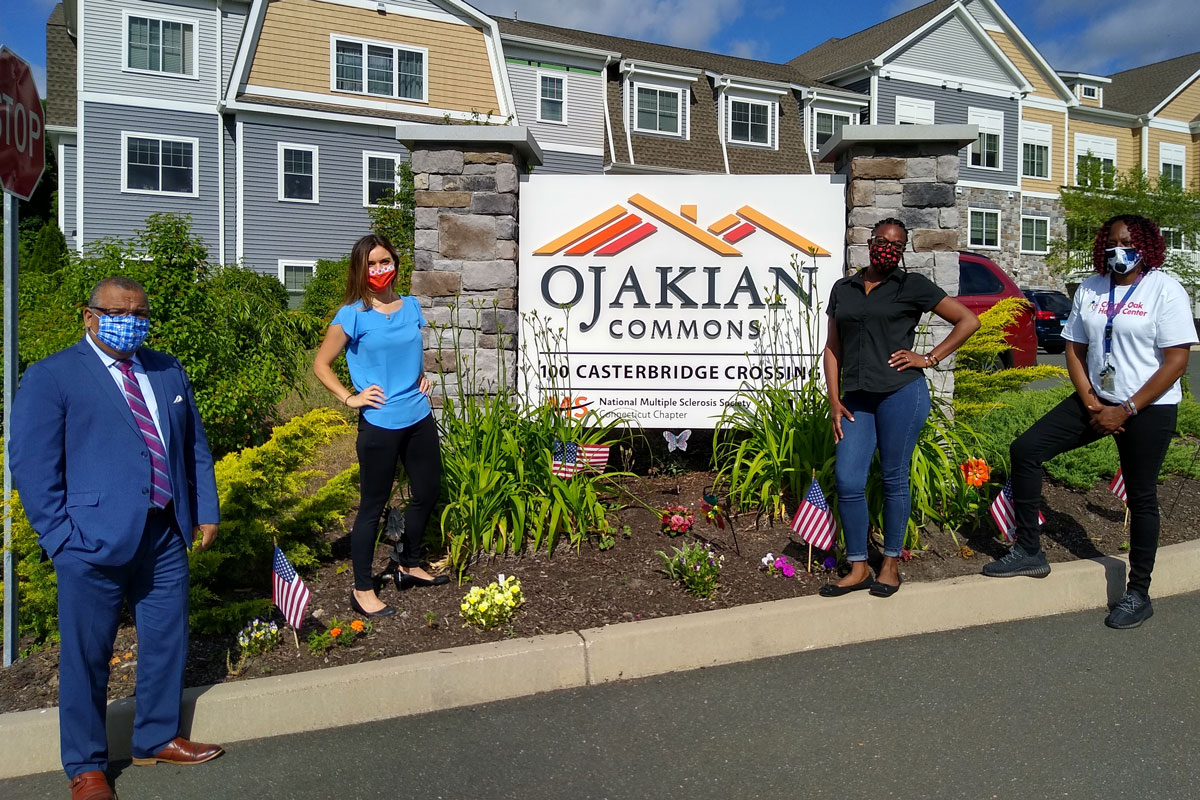A 48-unit residence in Simsbury called Ojakian Commons is home to many who are considered vulnerable to complications from COVID-19.
The building opened five years ago with the goal of providing accessible, affordable supportive housing for people with disabilities needing services coordinated by the National MS Society.
Since March, nurse practitioner Marina Creed ’11 (NUR), ’17 MSN and Dr. Jaime Imitola from UConn Health’s Multiple Sclerosis Center have been working with the Connecticut chapter of the National MS Society to provide masks, groceries, and other supplies to the residents, many of whom have some form of disability or suppressed immune systems.

Last week, the residents had access to on-site COVID-19 testing, thanks to a partnership involving UConn Health, Trinity Health, and the Charter Oak Health Center, which brought its mobile medical and dental van and set up tents in the parking lot.
“This is an independent living facility that could have a risk level approaching that of a traditional nursing home,” Creed says. “If we’re going to stamp out COVID-19, we’re going to have to have accessible testing, and this is especially important as we start to open up. We’re still not entirely certain how this virus operates.”
Christina Ciarcia is one of the youngest people living at Ojakian Commons. She’s 34, her diagnosis came in her late 20s, and she says there’s evidence her condition originated in her teens – a reminder of how MS can strike early. She says the pandemic has had an impact both emotionally and physically.
“We’re not going anywhere,” she says. “There are no gatherings. We have to stay distant. I mean, there’s a woman in here, she hugs everybody every day. She hasn’t been able to hug anybody in months and I know it’s breaking her heart. It’s taking a huge emotional toll on us, and stress is one of the biggest problems for MS. So having this stress of this pandemic is definitely affecting us.”
Ciarcia says she recently completed her third round of semi-annual infusion therapy at UConn Health. Although she suffers from severe fatigue and weakness, she walks on her own and describes herself as the healthiest she’s been since her diagnosis.
“Our main goal is to make sure everyone gets tested, and to eliminate any types of barriers to getting tested,” says TJ Clarke, a spokesman for the Charter Oak Health Center.
One of the residents who came out for a COVID-19 test was Dorothy Castro, who says she was diagnosed with MS 17 years ago, when she was in her late 30s. Hers was one of the resident voices that helped make the onsite testing possible.

“It’s just that we are all here in this community and we all have comorbidities,” Castro says. “I’m just thinking that we’re more susceptible than everybody else, and I just worry about everybody here. At first a lot of people weren’t wearing masks, so I just thought it would be a good idea for everyone to get tested. I am so glad and appreciative to all the doctors and administrative staff who made this testing available to myself and my community because it really gives us a peace of mind.”
It was early March when Creed and Imitola, the director of the UConn Health Multiple Sclerosis Center, had just completed an early set of COVID-19 guidelines for MS patients based on the emerging data from national and international registries and communication with colleagues around the world.
“I wanted to talk to my patients here, and some of the residents were very concerned,” Imitola says. “That’s when we started to pull together resources to try to educate the patients about COVID-19 and MS. There were people inside who were not informed, there were people who did not have masks.”
From there, the need for groceries and supplies became apparent.
“We gathered support from private donations of masks and supplies to UConn leadership and faculty, including the primary care program getting involved and UConn medical student volunteers checking on residents’ well-being,” Imitola says.
Those efforts expanded, with Creed leading the effort to bring testing into a vulnerable community that largely had been homebound for months.
And after a few hours at Ojakian Commons the morning of June 19, Charter Oak moved its mobile testing site about a mile away and opened it to the general public for the rest of the day.
“What started as private testing turned into the first public, community-based COVID-19 testing in Simsbury,” Creed says.
“We continue our commitment to provide excellent and coordinated care for MS and other neuroimmunological disorders,” Imitola says. “COVID-19 is not going away anytime soon and we need a long-term effort. We are glad to partner with the MS Society of Connecticut and UConn Health volunteers, not only to bring help and knowledge, but also participate in multicenter research on the long-lasting effects of COVID-19 in our MS population.”
Learn more about the UConn Health Multiple Sclerosis Center.



